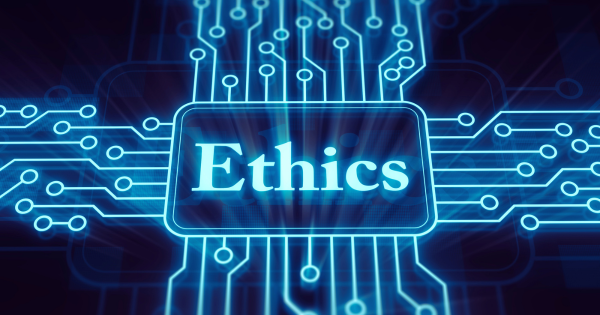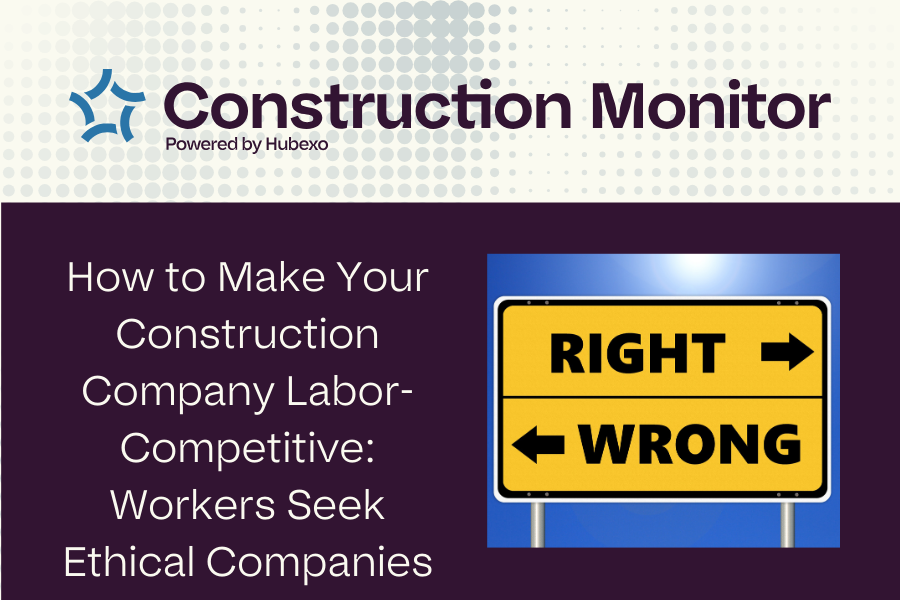Table of Contents
- What Makes an Ethical Company?
- Workers Seek Ethical Construction Companies
- Implementing Ethical Behavior in Your Construction Company
- The Role of Business Practices in Labor Competitiveness
Updated on 11/5/2024.
The U.S. construction industry recorded 288,000 unfilled jobs in September 2024, but construction companies are consistently passed over by applicants. Job seekers say they are searching for innovative, diverse company cultures driven by ethical standards.
What does that mean?
An ethical business is one that considers the impact its actions, products, and services have on the environment, people, and animals. –Startups
What Makes an Ethical Company?

Ethical Business Practices
An ethical company goes beyond merely meeting legal requirements; it operates with a commitment to integrity, transparency, and accountability. Ethical business practices involve cultivating a culture where ethical standards are embedded in every decision, from interactions with employees and customers to relationships with suppliers and partners. Companies that prioritize ethics demonstrate consistency in honoring commitments, treating all stakeholders with respect, and ensuring fairness in their practices. Ethical companies also prioritize responsible sourcing, data protection, and honest marketing, building trust and goodwill that foster long-term customer loyalty and a positive brand reputation.
Related: Why the Construction Industry Runs on Building Permit Data.
Sustainability for Sustainable Success
Incorporating sustainability into business practices is essential for companies aiming for long-term success in today’s market. Sustainable companies consider the environmental impact of their operations and take steps to reduce their carbon footprint, conserve resources, and adopt environmentally friendly processes. Beyond reducing waste and emissions, they also focus on creating products or services that support a sustainable future. By doing so, companies not only appeal to environmentally conscious consumers but also gain a competitive advantage as regulators and investors increasingly favor businesses with a strong commitment to sustainability.
Related: Construction Labor Productivity Starts with Technology.
Competitive Compensation and Fair Wages
Offering competitive compensation and fair wages is a cornerstone of ethical business practices. By providing employees with wages that reflect the value of their work and align with industry standards, companies can attract and retain top talent. Fair compensation includes not only wages but also benefits such as health insurance, retirement plans, and paid time off, ensuring employees feel valued and supported. Companies that prioritize fair wages contribute to the well-being of their workforce and foster loyalty and morale, which positively impacts productivity, reduces turnover, and builds a reputation as a desirable employer.
Related: Hard-to-Fill Construction Industry Jobs.
Providing Genuine and Ethical Solutions
An ethical company focuses on providing genuine solutions that meet real customer needs, avoiding tactics that manipulate or exploit consumers. This means offering products and services that are safe, reliable, and transparently marketed, free from misleading claims or hidden fees. Companies with an ethical focus prioritize customer satisfaction and long-term relationships over short-term profits, innovating solutions that genuinely enhance their customers’ lives. By aligning their offerings with their values, ethical companies gain trust and establish a reputation for integrity, creating a loyal customer base that appreciates the honesty and reliability of their brand.
Related: How to Get Construction Leads.
With real-time updates an analysis on market trends, a million permits added weekly, and nationwide coverage, construction professionals should be able to streamline all aspects of their workflow, and non-construction pros can get the most accurate, up-to-date data on the market with Hubexo.
Get started with a sample of our weekly edition of permit data below.
Workers Seek Ethical Construction Companies

You make a substantial investment in new hires. They don’t discount that, but today’s workers see your company as their life-investment. HR Dive’s Caroline Colvin reports workers seek ethical construction companies as one way to protect their careers.
They choose carefully.
Good Construction Workers Avoid Unethical Companies
Construction management consultant Paul Netscher said unethical behavior by construction companies can “lead to loss of reputation, which impacts future work. …Contractors have faced lengthy legal battles and suffered large monetary fines for unethical behavior.” He added that unethical construction companies will find project productivity is seldom what it should be, which costs them even more.
Related: The Ultimate Guide to Risk Mitigation.
Organizations frequently cited for safety violations are likely the best example of what jobseekers avoid. Another example might be companies that have a reputation for looking the other way when shortcuts are taken that save time but compromise project quality. For today’s construction workers, subtle discriminatory practices aren’t minor problems; they are major red flags that will not be tolerated by “good sports.”
Examples of construction business unethical behaviors or practices include:
- Accommodating deceitful clients that leak the lowest project bid and request you submit another, lower-priced bid
- Cramped, dirty worker break areas/bathrooms
- Disregarding employee theft
- Employing immigrants without documentation (and paying below minimum wage)
- Engaging in substandard environmental practices
- Fixing project bids (“losers’ fees, etc.)
- Ignoring change requests
- Not paying workers, subcontractors agreed-upon wages
- Paying bribes
- Refusing to honor contracts
- Slow-to-pay workers, subcontractors
- Submitting fake/altered expenses, insurance/legal claims
- Submitting poor-quality/defective project deliverables
- Unreported use of substituted, substandard materials
Business ethics is about being honest and fair in all interactions. It means not compromising compliance, safety, or quality. It means paying what is fair and not profiting from other companies’ mistakes.
Related: You Shape Your Construction Workers’ Safety Attitudes.
Implementing Ethical Behavior in Your Construction Company

Implementing ethical behavior in a construction company requires a commitment to creating a strong ethical culture. This begins with establishing clear ethical principles that guide all business practices. Providing training and resources to employees is crucial to ensure they understand and adhere to these principles. Business leaders must lead by example, demonstrating a commitment to ethical conduct and holding themselves and others accountable for upholding the company’s values. By fostering a culture of integrity, transparency, and accountability, construction companies can build trust with clients, stakeholders, and the local community. This trust is essential for maintaining a positive reputation and achieving sustainable success.
Related: The Importance of Reviewing Projects Even When You’re Busy.
The Role of Business Practices in Labor Competitiveness

Business practices play a significant role in labor competitiveness, particularly in the construction industry. Companies that prioritize fair labor practices, such as paying fair wages, providing safe working conditions, and promoting diversity and inclusion, are more likely to attract and retain top talent. Ethical business practices enhance a company’s reputation, leading to increased customer loyalty and retention. Furthermore, companies that prioritize ethical conduct are more likely to comply with federal agencies’ regulations, reducing the risk of legal and financial repercussions. By adopting ethical business practices, construction companies can create a positive work environment that attracts skilled workers and fosters long-term success.
Related: Construction Business Company Culture.
Fair Labor Practices
Fair labor practices are essential for promoting a positive and productive work environment. Construction companies must prioritize fair wages, safe working conditions, and equal opportunities for all employees. This includes providing training and resources to employees, promoting diversity and inclusion, and addressing any instances of discrimination or harassment. By fostering a culture of respect, empathy, and fairness, companies can attract and retain top talent. Fair labor practices not only improve employee satisfaction and productivity but also enhance the company’s reputation as an ethical and desirable place to work.
Related: Your Construction Business & Worker Benefits.
Responsible Business Practices
Responsible business practices are critical for promoting sustainable success and reducing the risk of unethical practices. Construction companies must prioritize transparency, accountability, and ethical decision-making in all aspects of their business. This includes complying with federal agencies’ regulations, reducing their environmental impact, and promoting fair labor practices. By fostering a culture of integrity, transparency, and accountability, companies can build trust with clients, stakeholders, and the local community. Responsible business practices not only enhance a company’s reputation but also contribute to long-term success by ensuring ethical conduct and compliance with regulations.
Related: Formula to Improve Construction Worker Productivity.
Our company promotes construction company profitability through subscriptions to building permit analyses. Our data is customized to generate business-building leads in your area.
Read similar posts on our blog page.
Get started with a sample of our weekly edition of permit data below.

